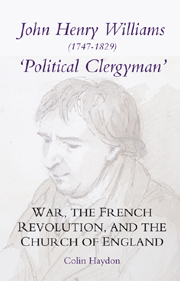 John Henry Williams (1747–1829): 'Political Clergyman'
John Henry Williams (1747–1829): 'Political Clergyman' Book contents
- Frontmatter
- Contents
- Dedication
- Illustrations
- Preface and Acknowledgements
- Abbreviations
- Editorial Note
- 1 The Grave and the Memory
- 2 The Formative Years
- 3 The Ivy-mantled Tow'r: Parish and Pastoralia
- 4 The Gathering Storm
- 5 By Far the Heaviest of All Earthly Calamities: Williams' Anti-War Sermons
- 6 Anxiety, the 1797 Campaign, and Afterwards
- 7 Assessment
- Bibliography
- Index
- STUDIES IN MODERN BRITISH RELIGIOUS HISTORY
7 - Assessment
Published online by Cambridge University Press: 12 September 2012
- Frontmatter
- Contents
- Dedication
- Illustrations
- Preface and Acknowledgements
- Abbreviations
- Editorial Note
- 1 The Grave and the Memory
- 2 The Formative Years
- 3 The Ivy-mantled Tow'r: Parish and Pastoralia
- 4 The Gathering Storm
- 5 By Far the Heaviest of All Earthly Calamities: Williams' Anti-War Sermons
- 6 Anxiety, the 1797 Campaign, and Afterwards
- 7 Assessment
- Bibliography
- Index
- STUDIES IN MODERN BRITISH RELIGIOUS HISTORY
Summary
Williams' Last Years
It has been seen that, in his last years, Williams chose to undertake personally, for as long as possible, his duties as vicar of Wellesbourne with Walton Deyville. Now, he was the patriarch of Wellesbourne; in 1828, the year before his death, he celebrated fifty years of his ministry there. His interest in politics continued to wane – hardly surprisingly, since the Tory administrations of the 1810s and 1820s seemed for so long all but invulnerable. Regarding his private concerns, Williams wished to organize his finances effectively and make proper provision for his children after his death. And, having settled earthly things, he wanted to prepare for the day when he would meet his God.
For a time, one source of satisfaction for Williams lay in his children, their seemingly assured security and good prospects. However, first misfortune, and then tragedy, were waiting in the wings.
Harry Williams enjoyed a smooth and successful career. In 1797, he went to Oxford, matriculating from Brasenose College, then the most prestigious college in the University. On graduating BA in 1801, he was awarded one of the College's Hulme exhibitions, allowing him to prepare for ordination. In 1803 and 1804 respectively, he was elected a probationer, then a full, fellow of Merton College – the college which his father had joined in 1774. In 1805, he proceeded MA, was ordained deacon in 1807, and was priested the following year.
- Type
- Chapter
- Information
- John Henry Williams (1747–1829): 'Political Clergyman'War, the French Revolution, and the Church of England, pp. 139 - 154Publisher: Boydell & BrewerPrint publication year: 2007
